Banks and boats will be Canberra’s key battleground
In the 2004 election, the Howard government defied poor polling to defeat Labor. Here’s how Scott Morrison can do the same.
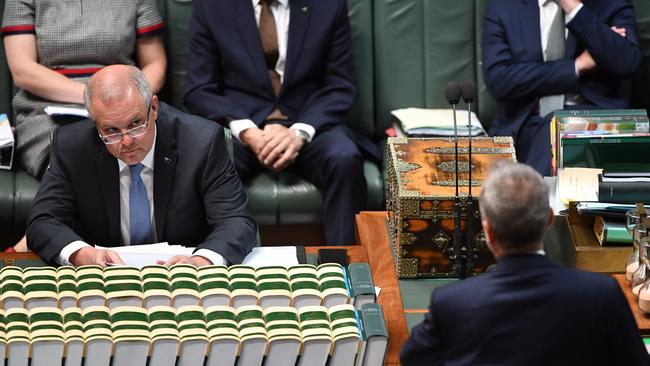
Yesterday’s Newspoll ahead of today’s return of parliament suggests the government is near enough if the Liberals and Nationals are good enough.
That was certainly the message in Prime Minister Scott Morrison’s National Press Club address yesterday, which included an upbeat assessment of his government’s prospects.
Down 47 per cent to 53 per cent on the two-party vote roughly three months out from an election is not necessarily insurmountable.
John Howard entered a six-week campaign against Mark Latham down 46 per cent to 54 per cent, before increasing his majority on election day.
However, Morrison’s government is less united than Howard’s was in 2004, and this sitting fortnight risks being tumultuous, given the Coalition now rules as a minority administration.
“Last election the Liberals said a vote for them would avoid the chaos of minority government. Now that is exactly where they’ve landed and it was caused by their own division,” manager of opposition business Tony Burke argues.
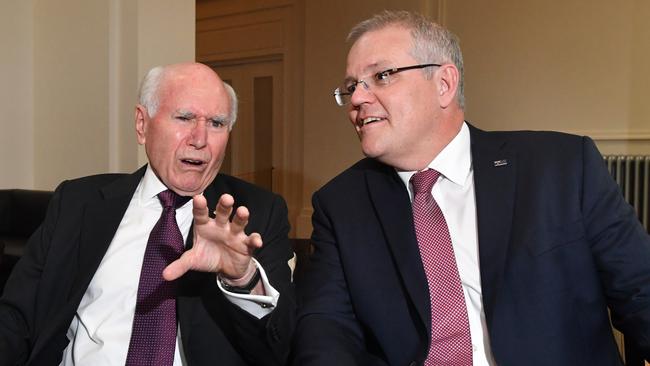
Labor aims to use the sitting period to highlight divisions and dysfunction. A similar tactic was adopted by Tony Abbott as opposition leader during the 2010-13 term of parliament when prime minister Julia Gillard led a minority Labor government.
But there are signs of life for the government in the aftermath of the divisions last year, starting with a shift in control of the agenda in recent weeks.
For the past fortnight the Coalition has created a stinging narrative on Labor’s tax plans, backing up the attacks with a negative ad campaign that started on Sunday and will run over the coming fortnight across all the major television networks. The ad features a wrecking ball knocking down a wall with commentary suggesting that is what Labor’s policies on issues such as negative gearing will do to the economy.
The government has also been on the attack over whether doctors should be able to override the minister on asylum-seekers, accusing Labor of putting border security at risk.
While the campaign has often misrepresented the true nature of the crossbench bill Labor supported in the Senate, this week’s debate is likely to be conducted on the government’s terrain.
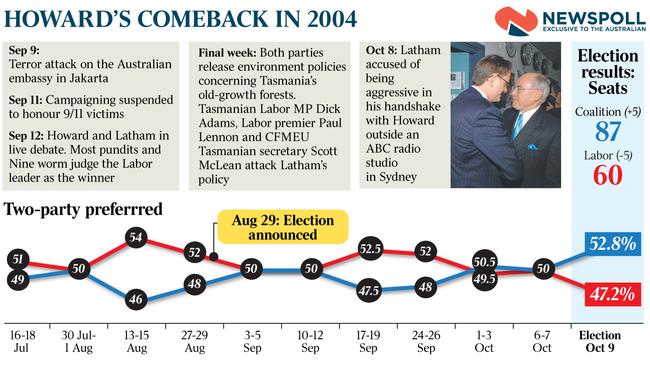
Morrison used the issue as one of the central points in his NPC address yesterday, on the same day Labor leader Bill Shorten received an official briefing from security agencies.
There is an increasing expectation Labor will force amendments to the crossbench bill to give the minister complete authority to reject medical transfers, not only on national security grounds as is currently stipulated in the bill.
There is even talk of walking away from the bill entirely after the Labor caucus meeting overnight, although that seems less likely.
The medical treatment bill will go before the house once parliament resumes today, and while the potential for the government to lose a vote on the floor of the house on a substantive bill is real — and it would be the first time this has happened in a generation — such a result carries more risks for Labor than the Coalition.
Liberal strategists know they must play to their strength if an unlikely election victory can be manufactured.
“For the rest of the 45th parliament, the Coalition will focus like a laser beam on national security and the economy, including the budget,” says Leader of the House Christopher Pyne.
“We will remind the people of the risk that Labor poses to their incomes, their house prices, their businesses and jobs. It will be willing but it’s important.”
Pyne’s reference to a “willing” campaign is a polite way of describing just how brutal the attacks are likely to become as polling day approaches.
Not that a Labor opposition that pushed the “Mediscare” narrative in 2016 has a right to complain about disingenuous scare campaigns.
Polling consistently puts the Coalition in front of Labor on managing the economy and border security, and these are the twin issues in the spotlight now.
The latest Newspoll suggests the dip in the wake of the bloodletting to remove prime minister Malcolm Turnbull has stabilised.
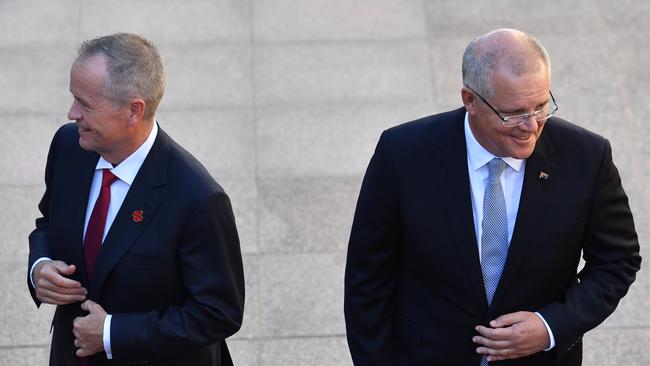
While the highs of four consecutive polls showing the Coalition trailing Labor by only 49 per cent to 51 per cent remain beyond Team Morrison, at least the slide has been arrested. For now.
Unless further gains can be made from the lows of late last year the risk remains for the government that panic will set in closer to polling day.
“We will keep implementing our plan for a stronger economy, more jobs, a safer Australia and to ensure Australian families have the best possible opportunity to get ahead,” government leader in the Senate and Finance Minister Mathias Cormann says.
Conservative strategists maintain they are doing better in Queensland than when Turnbull was leader and lost the Longman by-election.
There are genuine hopes of picking up the north Queensland seat of Herbert, for example. However, greater gains are needed in the sunshine state to offset expected losses in Victoria, where a disastrous state election and a string of seat-by-seat published polls point to a Liberal rout.
The situation is only marginally better in NSW and Western Australia after high-profile Coalition retirements. Minister for Human Services and Digital Transformation Michael Keenan’s retirement brings the seat of Stirling, on a 6.1 per cent margin, into play alongside a handful of more marginal seats, including Pearce, held by Attorney-General Christian Porter, who is touted as a future leader.
In NSW the worst-kept secret in politics is that Craig Laundy, former minister for small business, the workplace and deregulation, will retire from his seat of Reid, which is virtually unwinnable for the Liberals without his candidacy.
Added to that is the distraction of the contest in Warringah, where a recent GetUp-funded poll suggests Abbott is in trouble against high-profile independent Zali Steggall.
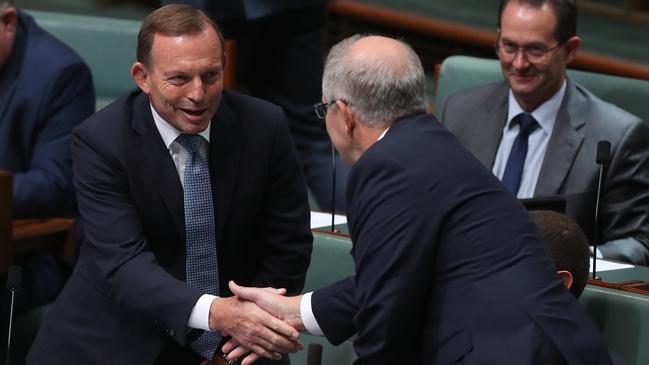
That said, Morrison has had a productive fortnight in the main battle with Labor, and will hope to build momentum over the next fortnight — perhaps by using his dominance in polls on the question of who is the better option for prime minister.
A lost vote on the crossbench over the asylum-seekers medical treatment bill has been spruiked by Labor as a reason for the governor-general to force an early election, based on convention, but that represents a misunderstanding of parliamentary practice.
A no-confidence motion would inevitably follow such a defeat for the government, but independent Cathy McGowan could be expected to cross back to the Coalition side to defeat it. She is on the record as favouring the government serving a full term.
More important, to achieve such optics of instability Labor would need to wave through the medical amendment bill it already helped pass through the Senate.
Morrison and Home Affairs Minister Peter Dutton will be delighted if it does, especially without amendments.
They see such a legislative change as political poison for the opposition — sharpening the differences between the parties on border protection to create an election-defining issue.
While the government has ensured that Labor’s policies on negative gearing and cuts to concessions for capital gains and dividend imputations have been in focus lately, ensuring that remains the case for another fortnight will be more difficult. A poor choice of words by Labor’s Treasury spokesman, Chris Bowen — all but daring people to vote against the opposition if they don’t like its policies — was seized on as arrogant by the Coalition.
“We will continue to ramp up our efforts to ensure Australians properly understand how Bill Shorten’s reckless high-taxing and soft-on-border-protection agenda would harm our economy,” Cormann says.
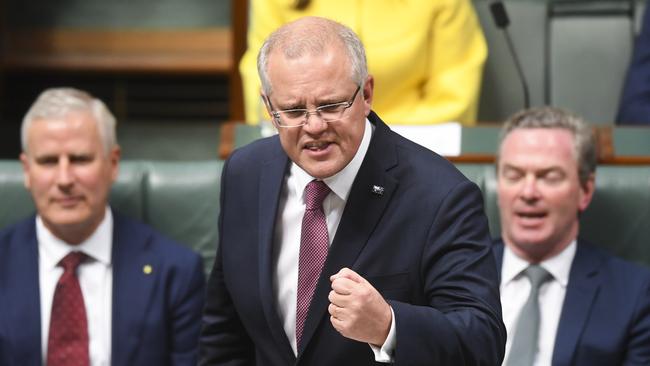
But Labor will try to use question time to target the banks, and in doing so remind people that the government was dragged to the royal commission kicking and screaming. So it’s banks and boats as the key battlegrounds between now and May.
Shorten has already called for additional sitting weeks ahead of the budget to help pass laws to rein in the banks as recommended in the royal commission report.
While the call was a strategic play, it is true the limited sitting agenda stifles the ability to implement recommendations before the election.
Labor will hope to go to the polls accusing the government of dragging its feet on banking reform to protect the big end of town — it may be the 2019 version of the 2016 Mediscare campaign.
“If this was a government serious about looking out for the Australian people they would agree to Labor’s proposal for extra sittings of parliament to act on the banking royal commission’s recommendations,” claims Penny Wong, leader of the opposition in the Senate. “Instead, the Morrison government is so divided they’ve given up governing and they are now just trying to cling to office as long as they can.”
Expect to hear such sentiments echoed in question time today and throughout the rest of the week.
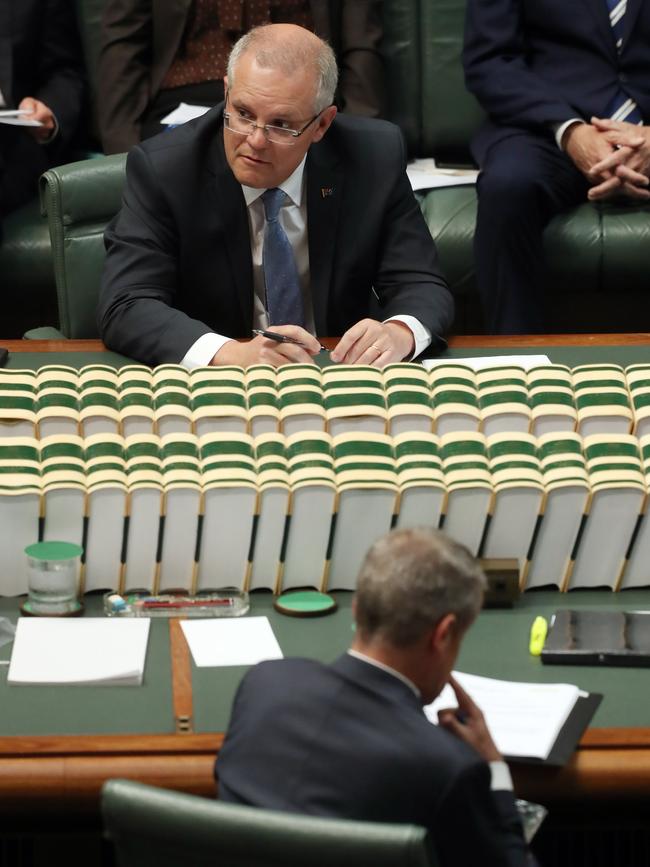
Parliament only sits for three days this week and four next week. The Senate sits only this week, with estimates hearings the following week.
After that the return to Canberra in April is for the early budget to accommodate a May election.
Most pundits expect a 33-day campaign for a May 11 or May 18 election, but there is the capacity for Morrison to delay an extra week if he feels he can emulate Howard’s 2004 performance.
The similarities in issues are interesting. In 2004 Howard put the economy front and centre, launching the campaign warning voters that interest rates would go up under Latham.
A scare campaign against the ill-fated Medicare Gold scheme was also effective.
Morrison will use Labor’s economic policies to spur fears over house prices and rents, as the new advertisements are already doing.
And the early budget is designed to reaffirm the Coalition’s credibility as economic managers by delivering a surplus for the coming financial year.
However, using economic management as a Coalition strength is more difficult now than it was for Howard.
In 2004 the Coalition ran on a record of having paid down government debt, yet debt has doubled since this Coalition government was first elected in 2013.
And of course Howard didn’t start the campaign from the position of minority government.
Peter van Onselen is a professor of politics at the University of Western Australia and Griffith University.

